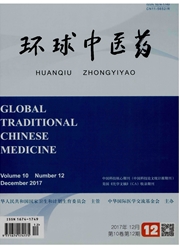

 中文摘要:
中文摘要:
中医药对于失眠症的治疗,具有疗效好、副作用少等优势。本文从调节神经递质、影响睡眠相关因子、改善中枢神经结构等方面对中医药治疗失眠症的作用机理进行综述。中医药主要通过三个方面的机制发挥对失眠的治疗作用:一是调节5-羟色胺、γ-氨基丁酸、前列腺素等抑制性神经递质及谷氨酸、多巴胺、去甲肾上腺素等兴奋性神经递质的含量;二是影响白细胞介素-1、白细胞介素-6、肿瘤坏死因子-α等细胞因子和胆囊收缩素、食欲素及其他睡眠相关因子;三是改善大脑皮层、中缝背核等中枢神经超微结构。中医药治疗失眠症的作用机理研究已取得明显进展,但对于中医药如何发挥多层次、多靶点优势,协调诸多睡眠因子的相互作用从而治疗失眠症,还有待进一步深入研究。
 英文摘要:
英文摘要:
With high incidence, insomnia plays a serious impact on people' s quality of life arid health. The traditional Chinese medicine (TCM) has fairly good effect and less side effects for the treatment Of insomnia. This article was going to summarize the action mechanism of TCM treatment to insomnia from the perspectives of adjusting neurotransmitters, influencing factors related to sleep and improving the central nervous structure. TCM has the functions in treating insomnia mainly through three aspects of mechanism: one is to adjust inhibitory such as 5-HT, GABA, PG, and excitability neurotransmitters such as Glu, DA, NA; Second is to influence cell factors like IL-1, IL-6, TNF-α and CCK-8, OrexinA and other factors related to sleep; Third is to improve central nervous uhrastructure of nuclear such as Brain cortex, Dorsal Raphe Nucleus, etc. Mechanism research of TCM treatment to insomnia has achieved significant progress, however, it still needs further study to know how TCM could take the advantages of muhi-level and multi-target and coordinate the interaction of so many sleep factors in treating insomnia.
 同期刊论文项目
同期刊论文项目
 同项目期刊论文
同项目期刊论文
 期刊信息
期刊信息
